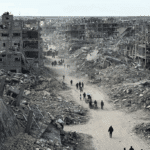N’Djamena, 12 November 2018 – This autumn, ASF presents a portrait of justice in Chad, through interviews with four people who are active in defending human rights in the country. This week, Delphine Djiraibe, founder of the Public Interest Law Center , talks to us about the fundamental role of paralegals, the first point of contact for people in Chad when they are looking for justice.
Former President of the Association Tchadienne pour la Promotion et la Défense des Droits de l’Homme (ATPDH), Delphine Djiraibe set up the Public Interest Law Center (PILC) in 2006. The organisation, which is present in fourteen locations around the country, promotes democracy and the state based on the rule of law, and offers legal aid and assistance to the most destitute people in society. To do this, it trains and supervises local actors, called “paralegals”.
What is a paralegal?
Delphine K. Djiraibe :
Paralegals are men and women who contribute to making the law accessible to people, on a voluntary basis. Often, they are simple villagers, not legal professionals, whom we select, train, and supervise. We introduce them to basic principles relating to human rights and offer them training modules on the legal problems that are most frequently encountered by members of their communities, such as violence against women or discrimination related to inheritance. The training also covers the right to a healthy environment, the right to education, and the right to vote, as well as the importance of the people’s role in monitoring the actions of those in power.
Currently, about 220 paralegals are active in Chad for the PILC. They contribute to preventing conflicts, for example by raising awareness and informing people about their rights and obligations and about the relevant legal procedures. Their work in conflict management mainly consists in providing assistance and advice to people, facilitating amicable settlements and mediating between parties to a dispute, referring people to other services (including the PILC) and/or to the courts when necessary (for example in criminal cases), and assisting people during the pre-trial phase.
So paralegals play an essential role in access to justice!
D.K.D :
Exactly! In Chad, where the formal legal structures are very removed from the people and where the majority of people don’t have the means to hire a lawyer, they really are ambassadors of the law to the population. Take for example the case of a woman who was abandoned by her husband. She didn’t know that she had rights. Thanks to the work of a paralegal, she received a maintenance payment in kind (sacks of millet, shea oil, etc.), enabling her to meet her needs and those of her child.
The work of paralegals helps to avoid automatic recourse to the police forces and the authorities. It also helps to ease the strain on the courts. The legal backlog in the country is enormous. Many cases have been awaiting a decision for years. This is due to the many strikes by the personnel of the justice system, and also to the endemic corruption and lack of independence in the legal system.
The importance of the role of paralegals is becoming increasingly recognised, by the people who benefit from their services as well as by the formal and traditional authorities, who, to begin with, saw them as competitors who threatened their position. In fact, paralegals now genuinely collaborate with traditional leaders in conflict management. Their work helps to ensure that it is done “by the book” and does not replicate gender-based discrimination or discrimination of any other kind, which exist in some traditional structures.
Madjibarné is a paralegal in Chad © Selma Khalil for ASF What challenges do paralegals face in their day-to-day work?
D.K.D :
Their working conditions are often challenging. They give up their time, even though many of them also have a job. They are in high demand, including in the surrounding areas. The lack of funds for travel and communication prevents them from reaching the most remote areas. They often lack adequate local premises. Paralegals are very committed people and, as I said before, volunteers. As their role becomes increasingly important, the question of paying them or, at the very least, covering their expenses, is increasingly pressing: how can it be organised and how can its sustainability be ensured? One solution would be to support the creation of a mutual fund.
The general insecurity in the country is another challenge. A paralegal travelling from one village to another to work, risks being attacked or robbed. In some zones where the PILC is active, there are a lot of conflicts between livestock farmers and agriculturists, which can be very violent.*
In 2016, all the civil society organisations that work with paralegals, with support from ASF, developed a joint document on the status and role of paralegals . This set out to standardise the rules and principles that govern the work of paralegals. It must now be implemented. In the PILC, another one of our aims is to establish a network of paralegals, so that they can discuss challenges and good practice. We have appointed facilitators, who keep them in touch with each other.What is clear, and what makes us keep going despite the difficulties, is that paralegals are very proud of their role and wouldn’t give it up for the world. They have become indispensable within their communities and are very proud when their work enables conflicts to be resolved peacefully.
* For more on this subject, see the ASF study Gestion des ressources naturelles et gestion des conflits sur les ressources naturelles : quelles améliorations possibles ?
****
This interview was carried out by Victor Odent, ASF Country Director in Chad.
Coming up:
– Interview with Pyrrhus Banadji Boguel, President of the Collectif des Associations de Défense des Droits de l’Homme
– Interview with Guerimbaye Midaye, Honorary President of the Ligue Tchadienne des Droits de l’Homme.
Cover photo: Delphine Djiraibe






